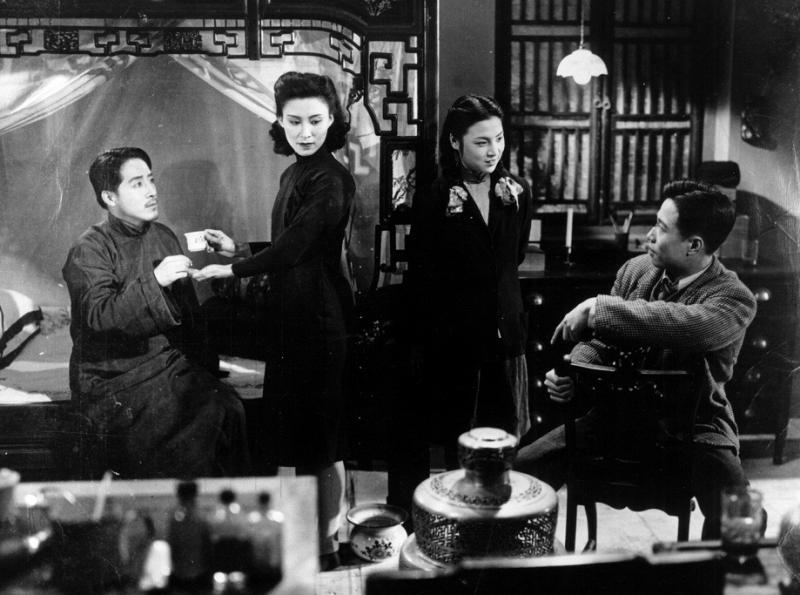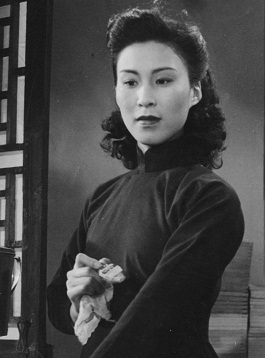Spring in a Small Town | reviews, news & interviews
Spring in a Small Town
Spring in a Small Town
Passions seethe against a background of wartime destruction

Shanghai director Fei Mu’s final film Spring in a Small Town appeared at the end of an era, coming out in 1948, a year before revolution engulfed China. The subsequent upheaval saw the director branded a “rightist”, or reactionary (he fled to Hong Kong. where he died three years later, aged only 45), and Spring… was shelved for almost three decades, only returned to audiences when a new print was made at the beginning of the Eighties.
Set at the end of the long Sino-Japanese war, there’s a palpable sense of devastation here, both of physical environments and accepted ways of life: it’s symbolized by scenes in which heroine Zhou Yuwen (the remarkable Wei Wei, pictured below right) simply stares across the ruined walls of her home out at the remains of the city beyond it. She’s the devoted but increasingly alienated wife of the sickly Dai Liyan (Shi Yu), who’s weakened and old beyond his years not only by consumption but more by his melancholy sense that the family’s time has passed (there’s little of anything consoling in the Chekhovian sense here, rather the feeling of what living in a post-Chekhovian world might feel like). Aside from the family servant, there’s only Liyan's teenage sister, Dai Xiu (Zhang Hongmei) for company.
A sense of the possibilities of life, as opposed to restrictions, has appeared
That’s until Zhang Zhichen (Li Wei), a childhood friend of Liyan who’s now a doctor in Shanghai, arrives: Yuwen had been his childhood sweetheart years earlier, and the tension of those remembered feelings bubbles underneath their restrained behaviour (one of the film’s later influences must have been Wong Kar-wai’s In the Mood for Love, another film of suppressed sexual tensions). No less importantly, his appearance also brings the depressed household back to life somehow (the "spring" of the film's title), as the characters leave their forlorn interiors to walk outside, sing songs and play games. A sense of the possibilities of life, as opposed to restrictions, has appeared, until a denouement comes which will change all (some echoes of Brief Encounter, of course). There are occasional moments that come close to melodrama, but they're somehow held back by a subtle directorial control and sense of formalism, as well as elements of humour.
 For such a restrained, chamber drama, Spring in a Small Town packs a hefty emotional punch, heightened by its cutting in and out of voiceover, and by luminous black and white cinematography by Li Shengwei: it has a style ahead of its time, which has drawn comparisons with European masters like Resnais and Antonioni from more than a decade later. The release of this gloriously restored print opens a new season at the BFI, A Century of Chinese Cinema, and Fei Mu’s film has been acclaimed in its time by some critics as the greatest Chinese film of all time. I’m not sure it quite stretches to that (and comparing so “small” a work with some of the much "larger" colour films of later decades seems almost irrelevant). But for its concentration of haunting emotion and sheer subtlety of texture, Spring in a Small Town is a masterpiece.
For such a restrained, chamber drama, Spring in a Small Town packs a hefty emotional punch, heightened by its cutting in and out of voiceover, and by luminous black and white cinematography by Li Shengwei: it has a style ahead of its time, which has drawn comparisons with European masters like Resnais and Antonioni from more than a decade later. The release of this gloriously restored print opens a new season at the BFI, A Century of Chinese Cinema, and Fei Mu’s film has been acclaimed in its time by some critics as the greatest Chinese film of all time. I’m not sure it quite stretches to that (and comparing so “small” a work with some of the much "larger" colour films of later decades seems almost irrelevant). But for its concentration of haunting emotion and sheer subtlety of texture, Spring in a Small Town is a masterpiece.
Spring in a Small Town opens June 20 at the BFI and selected cinemas nationwide as part of the season A Century of Chinese Cinema
The future of Arts Journalism
You can stop theartsdesk.com closing!
We urgently need financing to survive. Our fundraising drive has thus far raised £49,000 but we need to reach £100,000 or we will be forced to close. Please contribute here: https://gofund.me/c3f6033d
And if you can forward this information to anyone who might assist, we’d be grateful.

Subscribe to theartsdesk.com
Thank you for continuing to read our work on theartsdesk.com. For unlimited access to every article in its entirety, including our archive of more than 15,000 pieces, we're asking for £5 per month or £40 per year. We feel it's a very good deal, and hope you do too.
To take a subscription now simply click here.
And if you're looking for that extra gift for a friend or family member, why not treat them to a theartsdesk.com gift subscription?
more Film
 Bugonia review - Yorgos Lanthimos on aliens, bees and conspiracy theories
Emma Stone and Jesse Plemons excel in a marvellously deranged black comedy
Bugonia review - Yorgos Lanthimos on aliens, bees and conspiracy theories
Emma Stone and Jesse Plemons excel in a marvellously deranged black comedy
 theartsdesk Q&A: director Kelly Reichardt on 'The Mastermind' and reliving the 1970s
The independent filmmaker discusses her intimate heist movie
theartsdesk Q&A: director Kelly Reichardt on 'The Mastermind' and reliving the 1970s
The independent filmmaker discusses her intimate heist movie
 Blu-ray: Wendy and Lucy
Down-and-out in rural Oregon: Kelly Reichardt's third feature packs a huge punch
Blu-ray: Wendy and Lucy
Down-and-out in rural Oregon: Kelly Reichardt's third feature packs a huge punch
 The Mastermind review - another slim but nourishing slice of Americana from Kelly Reichardt
Josh O'Connor is perfect casting as a cocky middle-class American adrift in the 1970s
The Mastermind review - another slim but nourishing slice of Americana from Kelly Reichardt
Josh O'Connor is perfect casting as a cocky middle-class American adrift in the 1970s
 Springsteen: Deliver Me From Nowhere review - the story of the Boss who isn't boss of his own head
A brooding trip on the Bruce Springsteen highway of hard knocks
Springsteen: Deliver Me From Nowhere review - the story of the Boss who isn't boss of his own head
A brooding trip on the Bruce Springsteen highway of hard knocks
 The Perfect Neighbor, Netflix review - Florida found-footage documentary is a harrowing watch
Sundance winner chronicles a death that should have been prevented
The Perfect Neighbor, Netflix review - Florida found-footage documentary is a harrowing watch
Sundance winner chronicles a death that should have been prevented
 Blu-ray: Le Quai des Brumes
Love twinkles in the gloom of Marcel Carné’s fogbound French poetic realist classic
Blu-ray: Le Quai des Brumes
Love twinkles in the gloom of Marcel Carné’s fogbound French poetic realist classic
 Frankenstein review - the Prometheus of the charnel house
Guillermo del Toro is fitfully inspired, but often lost in long-held ambitions
Frankenstein review - the Prometheus of the charnel house
Guillermo del Toro is fitfully inspired, but often lost in long-held ambitions
 London Film Festival 2025 - a Korean masterclass in black comedy and a Camus classic effectively realised
New films from Park Chan-wook, Gianfranco Rosi, François Ozon, Ildikó Enyedi and more
London Film Festival 2025 - a Korean masterclass in black comedy and a Camus classic effectively realised
New films from Park Chan-wook, Gianfranco Rosi, François Ozon, Ildikó Enyedi and more
 After the Hunt review - muddled #MeToo provocation
Julia Roberts excels despite misfiring drama
After the Hunt review - muddled #MeToo provocation
Julia Roberts excels despite misfiring drama
 Ballad of a Small Player review - Colin Farrell's all in as a gambler down on his luck
Conclave director Edward Berger swaps the Vatican for Asia's sin city
Ballad of a Small Player review - Colin Farrell's all in as a gambler down on his luck
Conclave director Edward Berger swaps the Vatican for Asia's sin city
 London Film Festival 2025 - Bradley Cooper channels John Bishop, the Boss goes to Nebraska, and a French pandemic
... not to mention Kristen Stewart's directing debut and a punchy prison drama
London Film Festival 2025 - Bradley Cooper channels John Bishop, the Boss goes to Nebraska, and a French pandemic
... not to mention Kristen Stewart's directing debut and a punchy prison drama

Add comment